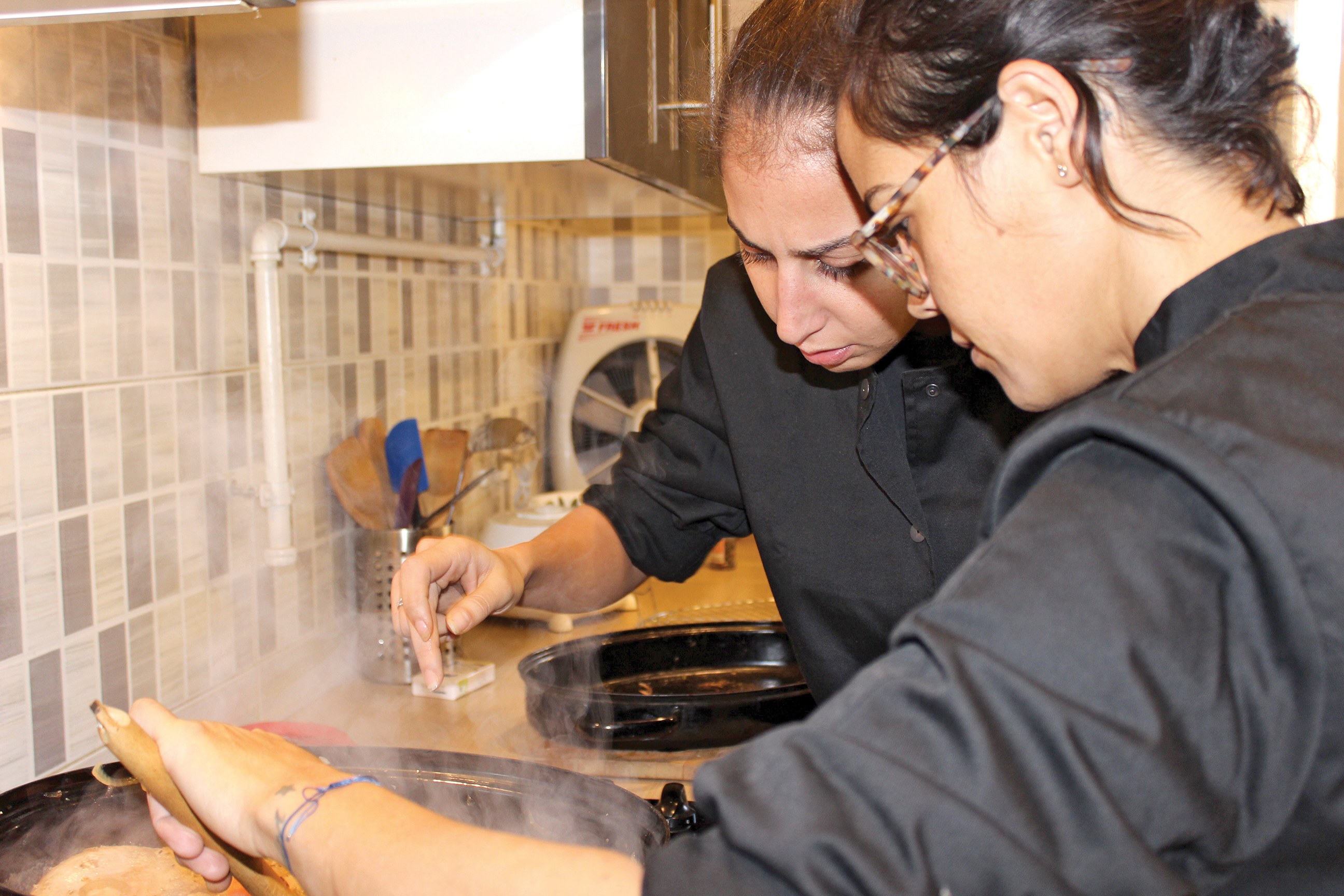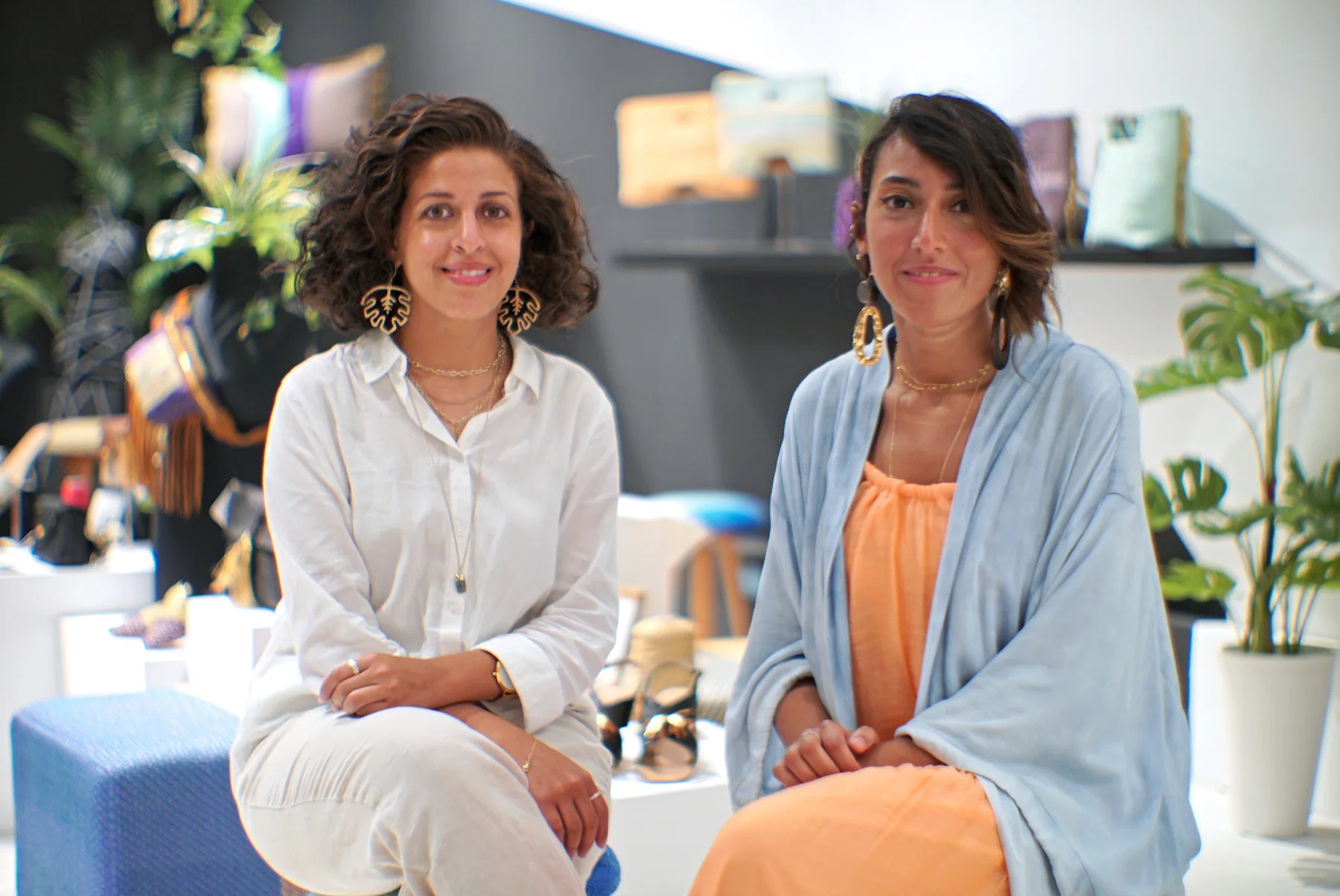In kitchens from Maadi to Mansoura, women are reclaiming Egypt’s food story — not as tradition keepers, but as inventors. They are rewriting recipes, rebuilding supply chains, and reminding a restless city that food, at its best, is both memory and revolution.
1. The Room That Started It All
A few steps into Downtown Cairo’s Kodak Passageway, the city softens. The traffic hum fades, the marble arcade filters the sun, and a small brass sign reads The Corner Shop. Inside, the air smells of roasted garlic, jasmine, and the faint tang of vinegar. At the far end, Chef Dina Hosny stands behind a long wooden table arranging plates like a conductor tuning an orchestra.
Tonight’s pop-up is titled Inheritance. Each dish tells a story. Siwa-salt-cured labneh drizzled with olive oil from her grandmother’s grove in Fayoum. Beetroot pickled in date vinegar. Flatbread made from a 150-year-old sourdough starter passed between generations of women.
“I’m not recreating heritage,” she says, sliding the last plate into place. “I’m extending it.”
Hosny’s dinners are small — 20 seats at most — but they’ve become one of Cairo’s hardest tickets to get. Her guests range from artists and architects to farmers and economists. The table, she says, is her medium. “Architecture taught me how to build space,” she smiles. “Food taught me how to fill it with people.”
When she left her career in design, friends called it reckless. “Cooking was supposed to stay domestic,” she recalls. “But the kitchen is the most political room in Egypt. Everything starts there — labor, class, gender, survival.”
That conviction has turned The Corner Shop into more than a restaurant. It’s a cultural node — a supper club, a test lab, and a storytelling platform where every menu interrogates a social idea: Salt, Mother Tongue, Memory, Labor.
2. A City in Transition
Cairo’s dining landscape has changed more in the last five years than in the previous fifty. International franchises now flank local cafés; influencer chefs advertise imported truffles; tasting menus quote in euros. Amid that glossy noise, a quieter movement is taking root — chefs, farmers, and entrepreneurs grounding their work in Egyptian soil.
The shift began around 2020 when the pandemic forced kitchens to look inward. Supply chains collapsed; imported ingredients vanished. “It was the best thing that happened to Egyptian cuisine,” says Farida El Gendy, founder of Nabat Farm Kitchen in Heliopolis. “Suddenly, we realized we had everything we needed right here.”
Farida studied agronomy before opening her kitchen. Twice a week she drives to Fayoum to meet growers who use regenerative techniques: crop rotation, compost, natural pest control. “When you cook with food that’s alive,” she says, “you can taste the land.”
Her clients — mostly young families and small cafés — receive produce boxes stamped with the harvest date and farmer’s name. “It’s not about being fancy,” she insists. “It’s about respect — for the seed, the soil, the person who pulled it from the ground.”
3. From Home Kitchens to Headlines
The movement’s power lies in its informality. Many of its leaders began in home kitchens during lockdown, posting menus on Instagram and delivering meals by metro. One of them, Noha El Zayat, launched Plant B, Egypt’s first fully vegan catering studio.
Her apartment in Zamalek doubles as workspace. “I started cooking because my niece had allergies,” she says, chopping sweet potatoes while a blender hums in the background. “Then I realized plant-based food is already part of our tradition — lentils, foul, molokhia — we just stopped recognizing it.”
Every Thursday she hosts a Vegan Souhour where diners sit cross-legged on the floor sharing bowls of lentil soup and roasted cauliflower tahini. “People think veganism is imported,” she says, laughing. “It’s not. It’s just ancient Egyptian minimalism with better marketing.”
Her delivery service now supplies ten cafés across Cairo, each committed to zero plastic packaging. Leftover pulp becomes compost for Nabat Farm Kitchen. “It’s a circular table,” Noha says. “Nothing leaves the loop.”
4. Rewriting the Supply Chain
For systemic change, though, the movement needed infrastructure. Enter Azza Sherif, co-founder of Tayebat Market. From a small office in Nasr City, she coordinates a network of thirty-two female farmers across Upper Egypt. Every Wednesday, trucks leave Minya and Qena carrying crates of tomatoes, okra, herbs, and dates to Cairo’s buyers.
“It started as a WhatsApp group,” Azza laughs. “Now it’s an economy.”
Her background in finance helped her design contracts guaranteeing fair prices and timely payments — a rarity in Egypt’s informal markets. “We don’t do charity,” she says. “We do business with dignity.”
At Tayebat’s small Saturday market in Zamalek, the stalls are stacked with produce labeled by region: Fayoum Garlic, Aswan Tomatoes, Beheira Lemons. Shoppers — many from Cairo’s young creative class — mingle with the farmers, tasting, asking questions. A woman in a linen dress points to a bundle of herbs.
“This smells like my grandmother’s garden,” she says.
The farmer smiles. “Maybe it is,” she replies.
5. The Numbers Behind the Narrative
The rise of women-led culinary ventures isn’t anecdotal; it’s measurable. According to Startups Without Borders’ 2024 Food Economy Report, 45 percent of new food startups registered in Greater Cairo have at least one female founder — nearly triple the figure from 2018. Many receive micro-funding from programs like She Can and Flat6Labs AgriTech.
Economist Laila Khalaf, who studies gender and entrepreneurship at the American University in Cairo, believes the sector reflects a larger social pivot. “Food is one of the few industries where women can scale informally,” she says. “They don’t need massive capital; they need networks — and they’re building them faster than anyone else.”
6. The Week That Changed Everything
The momentum became visible during Cairo Food Week 2025. On the second day, a panel titled “Women, Work, and the Kitchen Economy” filled the hall at the Grand Egyptian Museum. Hosny sat beside Chef Rania Hussein of Mala’ak and entrepreneur Mariam Tamer, founder of the zero-waste grocery Talet Market.
Moderator Nadine Hamdan opened with a simple question: “What does empowerment taste like?”
Rania answered first.
“Like molokhia cooked on a quiet day — slow, patient, green.”
Laughter rippled through the audience. Then Mariam spoke more bluntly:
“For years, sustainability was a Western badge. But our grandmothers invented it. They reused everything — bread, oil, time.”
Hosny added softly:
“We’re not chasing Michelin stars. We’re chasing meaning.”
After the session, young chefs queued to meet them, phones in hand, taking notes, selfies, maybe courage. Outside, under GEM’s vast glass roof, volunteers handed out edible cups filled with hibiscus tea — compostable, naturally.
7. Beyond Fine Dining
On the following Friday, The Factory in Downtown hosted Kitchen Conversations, a grassroots symposium where independent cooks shared failures and hacks. A group from Mansoura’s Sohbet Baladi Kitchen presented a model for neighborhood canteens that feed low-income families using surplus produce from local markets.
Founder Heba Eid explained: “We wanted to fight food waste, but we ended up fighting loneliness too. People come for lunch and stay for company.”
By the afternoon, chefs and farmers traded phone numbers; someone proposed a shared logistics hub; another offered to build a recipe archive. A small revolution, written on napkins.
8. Sustainability as Inheritance
Egypt has always known sustainability — it just called it survival. For centuries, desert agriculture forced efficiency: drying tomatoes, preserving lemons, fermenting dairy. What the modern movement is doing is giving those practices language, visibility, and pride.
At Nabat Farm Kitchen, Farida walks through rows of eggplants under the Fayoum sun. “My grandmother never threw away food,” she says. “We’re just translating her wisdom for a new world.”
She gestures to the compost heap at the edge of the field. “This is the real investment,” she laughs. “It’s not sexy, but it’s what keeps the soil alive.”
Later that week, she delivers boxes to a Maadi café, where the chef posts a photo captioned “Grown with gratitude.” Within minutes, the comments fill with emojis and preorders — digital proof that storytelling now sells as well as flavor.
9. Community as Cuisine
Every Sunday afternoon, a dozen women gather at Kafein Garden in Maadi. Some are chefs, others graphic designers, activists, or students. They bring baskets of herbs, homemade pickles, sourdough starters, gossip, and advice. The rule is simple: everyone leaves with something new — a recipe, a supplier, an idea.
On one visit, Mariam Tamer explains how she convinced a packaging factory in 10th of Ramadan City to switch from plastic wrap to palm-leaf paper. “They laughed at first,” she says. “Then they saw the market. Now they call me every week asking for feedback.”
Across the table, Dina passes around a jar of smoked date molasses. “We’re not building restaurants,” she tells the group. “We’re building culture.” Heads nod, notebooks open, phones click photos.
The gathering feels less like a meeting and more like an ecosystem — ideas pollinating across professions. “Every woman here feeds someone,” Farida says, “but together we’re feeding change.”
10. The Taste of Tomorrow
As dusk settles over Downtown, The Corner Shop glows again. Tonight’s theme is Future Tense. The menu: fermented carrot soup, black rice with carob glaze, and bread baked from heritage wheat cultivated in Beni Suef.
Before serving, Hosny addresses her guests:
“These ingredients traveled hundreds of kilometers. The least we can do is listen to them.”
Silence follows, then the clatter of cutlery. Conversations weave between art, politics, and childhood recipes. Someone recalls their grandmother drying figs on the rooftop; another debates the ethics of imported salmon. The night stretches into laughter and storytelling, into Cairo itself.
When the last plates are cleared, Hosny stands at the doorway, apron loosened, hair tied back. “People think food is temporary,” she says. “But every meal is a seed. It changes someone, somewhere.”
Outside, Kodak Passageway hums again with the city’s rhythm — motorbikes, vendors, music. Inside, the lights fade, but the idea lingers: that Egypt’s next revolution may not start in parliament or parliament halls, but in the kitchens of women who decided to cook differently.




